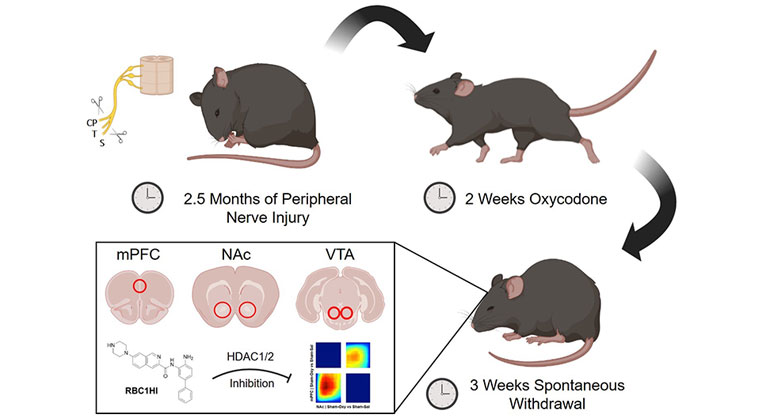Opioid Abuse Initiates Specific Protein Interactions in Neurons in Brain’s Reward System
RGS9-2 protein affects not only addiction, but analgesic relief and tolerance.
Identifying the specific pathways that promote opioid addiction, pain relief, and tolerance are crucial for developing more effective and less dangerous analgesics, as well as developing new treatments for addiction. Now, new research from the Icahn School of Medicine at Mount Sinai reveals that opiate use alters the activity of a specific protein needed for the normal functioning of the brain's reward center. Investigators were able to block the protein, as well as increase its expression in the mouse nucleus accumbens, a key component of the brain's reward center. It altered the actions of opioids like morphine dramatically. The preclinical study, published online Feb. 24 in the journal Neuropsychopharmacology, is the first to show that opioid use changes activity of the protein RGS9-2 and alters both the threshold for pain relief and affects opioid tolerance.
"We were able to block addiction-related behaviors, but increasing the activity of the protein also lowered the pain relief response to morphine, and mice developed morphine tolerance much more quickly," said the study's senior researcher, Venetia Zachariou, PhD, Associate Professor, Fishberg Department of Neuroscience, Friedman Brain Institute, Department of Pharmacology and Systems Therapeutics, at the Icahn School of Medicine at Mount Sinai.
Dr. Zachariou explained that because the brain's reward center has such a strong impact on analgesic responses, non-opioid medications should be used for the treatment of severe chronic pain conditions. Pain specialists have several alternatives for the treatment of chronic pain. For patients that are already addicted to opioids, "an alternative pain medication could offer more analgesic relief without the adverse effects of opioids." Additionally, with this research in hand, the research team points out that targeting this molecule may eventually lead to a novel treatment for addiction."
In the study, investigators used a novel technique known as optogenetics, which allows the activation of specific neurons via blue light in real time, to determine the exact cell types of the brain reward center responsible for the reduced analgesic response.
"In our earlier work, by inactivating RGS9-2, we saw a tenfold increase in sensitivity to the rewarding actions of morphine, severe morphine dependence, a better analgesic response, and delayed development of tolerance," said the study's senior author. While opiate analgesics act in several brain regions to alleviate pain, their actions in the brain reward center may also affect analgesia. The nucleus accumbens may also affect the development of morphine tolerance, via mechanism that are distinct from those described in other regions of the brain.
Eric Nestler, MD, PhD, Nash Family Professor of Neuroscience, Icahn School of Medicine at Mount Sinai, praised the research. "These discoveries provide important new information about the role of the brain reward pathway in the analgesic responses to opiates".
The study was carried out in collaboration with Mary Kay Lobo, PhD, from the University of Maryland, researchers from the University of Crete, and Karl Deisseroth, MD, PhD, from Stanford University, and coauthors from the Icahn School of Medicine.
Opioid addiction is widespread and this research underscores the deleterious effects of its use. According to the National Institute of Drug Abuse, in 2010, 1.9 million Americans satisfied abuse or dependence criteria for prescription opioids.
About the Mount Sinai Health System
Mount Sinai Health System is one of the largest academic medical systems in the New York metro area, with 48,000 employees working across seven hospitals, more than 400 outpatient practices, more than 600 research and clinical labs, a school of nursing, and a leading school of medicine and graduate education. Mount Sinai advances health for all people, everywhere, by taking on the most complex health care challenges of our time—discovering and applying new scientific learning and knowledge; developing safer, more effective treatments; educating the next generation of medical leaders and innovators; and supporting local communities by delivering high-quality care to all who need it.
Through the integration of its hospitals, labs, and schools, Mount Sinai offers comprehensive health care solutions from birth through geriatrics, leveraging innovative approaches such as artificial intelligence and informatics while keeping patients’ medical and emotional needs at the center of all treatment. The Health System includes approximately 9,000 primary and specialty care physicians and 10 free-standing joint-venture centers throughout the five boroughs of New York City, Westchester, Long Island, and Florida. Hospitals within the System are consistently ranked by Newsweek’s® “The World’s Best Smart Hospitals, Best in State Hospitals, World Best Hospitals and Best Specialty Hospitals” and by U.S. News & World Report's® “Best Hospitals” and “Best Children’s Hospitals.” The Mount Sinai Hospital is on the U.S. News & World Report® “Best Hospitals” Honor Roll for 2025-2026.
For more information, visit https://www.mountsinai.org or find Mount Sinai on Facebook, Instagram, LinkedIn, X, and YouTube.
Mount Sinai Researchers Identify Brain Protein That Promotes Maintenance of Chronic Pain
Oct 16, 2019 View All Press Releases